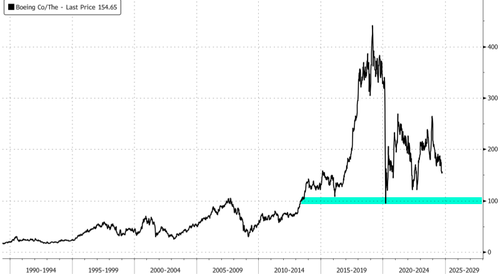Boeing Nukes Contract Offer With Union As S&P Warns About Potential Negative Credit Rating On Prolonged Strike
Boeing’s troubles keep piling up. On Tuesday, S&P Global Ratings placed the struggling aircraft manufacturer on CreditWatch negative, with mounting risks that its investment-grade credit rating would be slashed to junk. To make matters worse, Bloomberg reported that negotiations to end an almost monthlong strike with its largest union collapsed.
Beginning with the Bloomberg report, both Boeing and the International Association of Machinists and Aerospace Workers failed to reach a deal on a new labor contract as the strike marched on to its 27th day.
Boeing withdrew a labor contract deal that would’ve allowed the over 33,000 IAM members to receive 30% raises over four years. IAM is seeking a 40% pay increase over four years.
“Unfortunately, the union didn’t seriously consider our proposals,” Boeing Commercial Airplanes President and CEO Stephanie Pope wrote in a memo, adding, “Instead, the union made non-negotiable demands far in excess of what can be accepted if we are to remain competitive as a business.”
IAM leaders said the talks collapsed when Boeing negotiators refused to increase wages over the contract’s lifespan or reinstate the defined benefit pension.
“By refusing to bargain the offer, the company made it harder to reach an agreement,” the union said, adding, “Your negotiating committee attempted to address multiple priorities that could have led to an offer we could bring to a vote, but the company wasn’t willing to move in our direction.”
Separately, S&P issued a press release indicating that Boeing’s ratings, including the ‘BBB-‘ issuer credit rating and senior unsecured debt ratings, have been placed on CreditWatch with negative implications.
“The CreditWatch listing reflects the increased likelihood of a downgrade if the strike persists toward the end of the year, further constraining the recovery in the company’s cash flow generation and the company does not raise capital sufficient to meet its upcoming needs in such a way that does not increase financial leverage,” S&P said.
S&P estimated the labor action costs Boeing $1 billion per month. They expect the target of producing 38 Max jets per month will be pushed to mid-2025.
There’s also concern the planemaker will need to raise money via public equity markets (read more about dilution fears) with its cash balance dwindling:
Boeing will likely seek incremental funding. We anticipate that Boeing will end 2024 with a cash balance below its $10 billion target if the strike continues through the fourth quarter and the company typically uses cash in the first quarter due to seasonal working capital build. Boeing also has approximately $4 billion of debt maturities due in April 2025. We believe the company will need to seek external capital to meet these demands. Based on its public comments, we assume Boeing is also open to potentially issuing additional equity. However, we believe the company remains exposed to higher-than-expected cash usage and adjusted debt for the next year or two, which could further delay the expected recovery in its credit measure to levels we view as consistent with the rating.
S&P concluded:
The CreditWatch with negative implications placement reflects our view that we could lower our ratings on Boeing if the strike continues, increasing costs and delaying the company’s recovery in aircraft production and cash flow generation. We could lower ratings if the company fails to preserve its target cash balance, fund operating and working capital, and meet debt maturities without increasing leverage. We intend to resolve the CreditWatch placement by the end of the year.
In markets, Boeing shares are down 1.6% in premarket trading around the $152 handle, which has served as a multi-year support level since shares crashed from $450-ish to $100 during March 2019 and December 2020 Max jet crashes.
It’s only a matter of time before Boeing turns to public markets to strengthen its balance sheet, as the company faces a significant risk of a credit downgrade to junk status if the strike prolongs.
Tyler Durden
Wed, 10/09/2024 – 09:45
via ZeroHedge News https://ift.tt/hSxmqlw Tyler Durden

